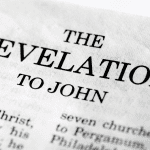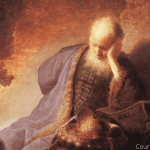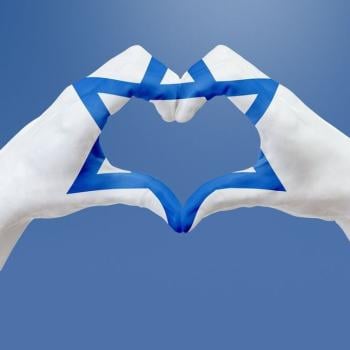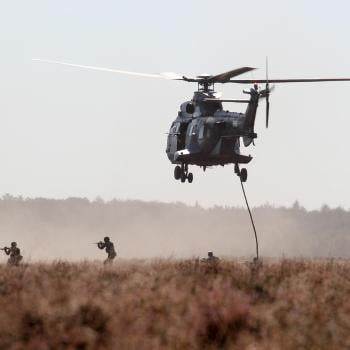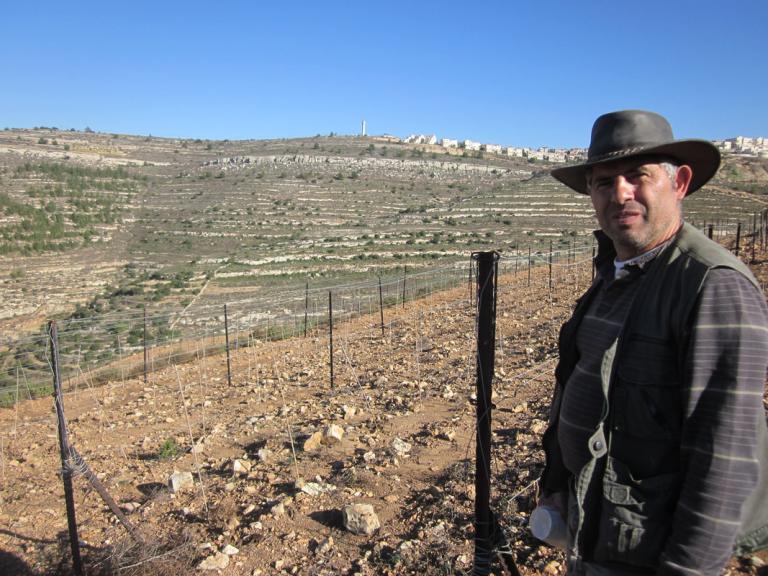
You may not know but:
- May 14 is the 75th anniversary of Israel’s independence. For Israelis and some Jews (not all Jews support the formation of the Jewish state of Israel), it commemorates the establishment of a Jewish homeland in the historical land of their ancestors.
- May 15 is the 75th anniversary for the Palestinian people of the Nakba (“catastrophe”). The Nakba commemorates the expulsion of 700,000 Arabs from their homes following the aftermath of Israel’s war of independence (a total of 500+ Palestinian villages were depopulated. Many of them were bulldozed and the rest became homes for the Jewish settlers. I highly recommend the book Blood Brothers by Elias Chacour).
Two weeks ago I was in Washington DC for some conferences on Israel-Palestine. I was blessed to see some good friends—some of whom I had not seen since before Covid (is this the new meaning of BC: “before Covid”?).
One of them was Daoud Nassar. (for more details on Daoud’s story see my post on Aug 9, 2022: see also this 12 min video interview with Daoud).
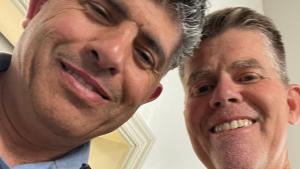
While in DC, I posted this picture of Daoud and myself on my social media feed with the caption: “This is Daoud Nassar. I respect no human being more than this man! He is the example of what it means to live as a Christian in the face of one’s enemies and to love them.”
I can easily say that I respect no human being more than this man.
The stoning of Stephen
When I tell others about Daoud, I often reference the story of the stoning of Stephen in Acts 6-7.
In Acts 6, Stephen was engaged in a dispute about Jesus with a number of the leading thinkers in Jerusalem. Unable to contend with Stephen and his arguments, the leaders brought Stephen before the authorities (the Sanhedrin) and accused him of speaking against the Law (of Moses) and the temple (Acts 6:14):
NB: These were the two common charges leveled against the early Christ-followers.
As Stephen stood before the Sanhedrin, Luke (the author of Acts) notes that “all who were sitting in the Council saw his face like the face of an angel” (Acts 6:15).
In the midst of conflict, in the midst of accusations against him, in the midst of threats (not stated by Luke but the fact that they “dragged him away” (Acts 6:12) and then had him stoned (Acts 7:58-59) suggests that threats were a part of the conflict), Stephen’s face was “like the face of an angel.”
That is what I think of when I think of Daoud Nassar.
NB: I was planning on continuing my post part 2 of my post, “Why asking, ‘What is God’s will for my life’ is problematic.” The urgency of the present post, however, means that I will have to wait a week or two to finish that post.
NB: Also note that this post is a bit longer. But the story is important and your actions are needed. If you need to finish later, please do so.
Daoud’s story is simple. Yet, it is tragically all too common among the Palestinians.
The Nassar farm: aka “The Tent of Nations”
The land upon which Daoud and his family live is about 6 miles southwest of Bethlehem. It sits atop a hillside that when the air is clear has a view of the Mediterranean Sea to the west.
The property is a short drive to church, the shops, schools, and other amenities in the city of Bethlehem.
Well, it used to be!
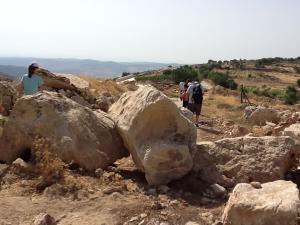
This is a picture I took more than 10 years ago of the main road from Bethlehem to the Nassar farm. And although we were able to park our vehicles and walk the mile or so to the farm, the reality is that the Nassars cannot. Their vehicles would not be safe. They cannot carry groceries or other goods that distance. And walking to their home at night or in the rain wouldn’t be feasible.
Oh, and there is another problem: the road doesn’t exist anymore. The Israeli government has since built a Yeshiva (a school) right where we parked and now the road is permanently closed for everyone (there is no way the Israeli gov’t will allow a Palestinian family to come near the school).
Lacking access to their property—the other road by which they travel is unpaved and takes 30 mins or more to traverse—is among the least of the Nassar family problems.
You see the Israeli government has been working for more than 30 years to drive the Nassar family off their land.
In order to explain what is happening and what you can do about it, let me step back and give some background on the Nassars’ story.
Daoud’s family are devout Christians. The Nassar family often hold summer camps for the children in the neighboring villages (most of whom are Muslim) in order to provide them with activities and to tell them the story of Jesus.
Their presence on the farm dates back to 1916 when Daoud’s grandfather purchased the land from the Ottomans. Unlike many who purchased land in those days, Daoud’s grandfather registered the land and its purchase with the Ottoman authorities (many did not register lands because they wanted to avoid paying taxes).
Daoud’s family then reregistered the land a few years later at the end of WWI when it fell under the control of the British after the collapse of the Ottoman Empire. And the family again reregistered the land when the Jordanians gained control of the West Bank in 1948.
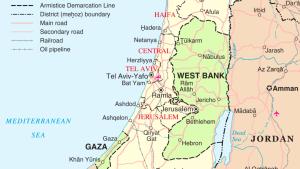 The problem for the Nassar family is that the farm is on a hilltop which is surrounded by five Israeli settlements.
The problem for the Nassar family is that the farm is on a hilltop which is surrounded by five Israeli settlements.
NB: an Israeli settlement refers to cities (they began as outposts) inhabited by Israelis that are built entirely on Palestinian land. They begin when Israeli settlers confiscate Palestinian lands and construct illegal outposts. Over time, the Israeli government resources the settler outposts, and large construction projects follow. Suddenly, entire cities began to rise up. Today there are over 200 settlements with approximately 700,000 Israeli residents in the West Bank. Many of the settlements are large cities complete with schools, shopping, parks, theatres, and all the comforts of home. 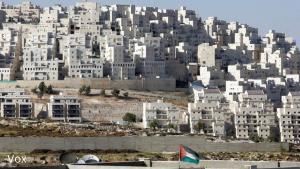
The Nassar farm sits in the midst of five such settlements. Their land is coveted by the Israeli government because it would enable Israel to connect the five surrounding settlements into one large contiguous Israeli development.
In addition, hilltops are especially coveted for settlement expansion by the Israeli government due to the military advantage of holding the high ground.
The Nassar troubles begin in earnest in 1991 when the Israeli authorities declared their land “state land” in an effort to confiscate it.
And for the past 30+ years, the Israeli government has been trying to seize the Nassar farm.
During this time, the family has faced countless demolition orders from the Israeli military—sometimes giving them a notice on a Friday that the property will be demolished on Monday so that they must struggle to pursue the legal means necessary to halt the demolitions.
In addition to the legal woes, the family has also faced countless acts of violence against them and their land: including beatings, threats, and multiple occasions in which trees and orchards have been uprooted or burned—one must try to understand what a tree which was planted by one’s ancestor means to fully grasp the significance of such actions.
In the midst of it all, Daoud and his family continue to love their enemies and live out the ethic of Jesus. Their motto is simple, as the sign to enter the property, which is painted in Arabic, English, and German, says: “We refuse to be enemies.”
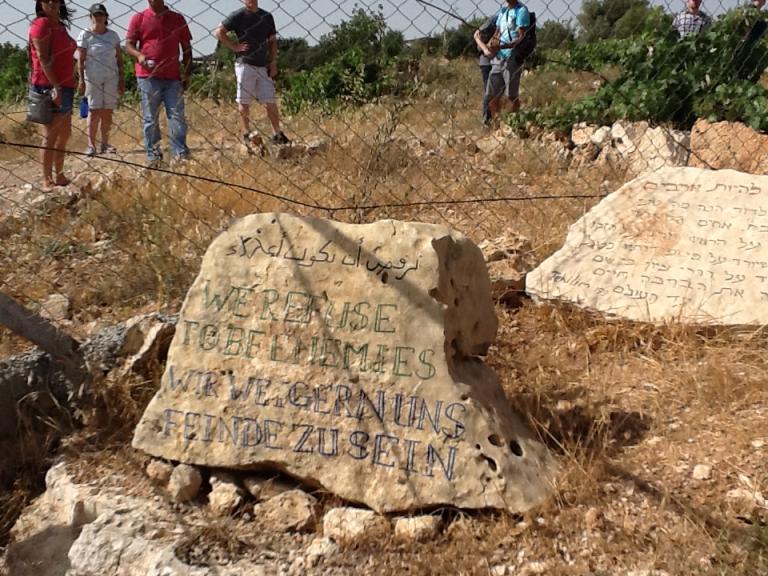
Why don’t they just leave?
This question may make sense to us Westerners and our individualistic culture. But for Daoud and his family there is a strong connection to the land. Daoud’s desire is to fulfill his grandfather’s dream to “create on this hilltop farm a place where freedom, justice and peace-making would thrive.”[1]
He cannot fulfill his grandfather’s dream if he leaves.
Present status
Daoud and his family have been trying to reregister their land with the Israeli government for decades. The Israeli government, however, has resisted time and time again—despite the fact that they have all the necessary paperwork.
In 2006, the Israeli Supreme Court approved their right to reregister the land. Since then, however, Israeli courts, however, have delayed and delayed and delayed.
NB: Here is a link to a “Timeline of the reregistration process that details the troubles the Nassar family have faced since 1991 (heads up: the list is long!).
The next meeting is set for May 15! And here is where they need your help.
What can you do?
- May 12: Fast and Pray for Tent of Nations: Join Churches for Middle East Peace (CMEP) and Daoud Nassar on May 12 at 12:30 pm EST to pray together for 30 minutes over the upcoming court hearing regarding the farm’s re-registration. Register here.
- Contact the Tent of Nations and get on their mailing list to get regular updates
- Contact your representative and ask for them to pressure Israel’s Coordinator of Government Activities in the Territories (COGAT) to complete the re-registration of the Nassar family’s legally owned farm located outside Bethlehem in the West Bank.
NB: You can find your Congressional member’s contact information using this link. Then scroll through the individual members’ websites in order to find either an email address or a contact form.
“Do not hold this sin against them”
I noted earlier that when I tell others about Daoud I often relate the story of the stoning of Stephen. At the end of the Stephen narrative, Luke adds that while the officials were stoning him, Stephen fell and “cried out with a loud voice, ‘Lord, do not hold this sin against them!’ Having said this, he fell asleep” (Acts 7:60). This is precisely what Daoud and his family have continued to do in the face of violent aggression. Not only has this family demonstrated what it looks like to love their enemies in the face of aggression, but they have also sought peace and reconciliation with their enemies.
Our goal is to keep these posts free of charge. I do not intend to ever hide them behind a paywall. I can only do this if those of you who have been blessed by them and can afford to give ($5, $10, $25, or more/month) do so. You can give a tax-deductible contribution by following this link.
Please share this post and let others know about determinetruth.
If you wish to view this blog on your smartphone through the Determinetruth app simply download the “tithe.ly church” app on your smartphone and insert “determinetruth” as the church name you wish to follow. Once it is loaded, simply click on the “blog” icon and it will automatically load.
If you would like to have Rob speak at your church or organization in person or via zoom, please let us know by filling out the contact info on the Contact me tab on this site.
[1] Quote taken from Daoud’s own story, Daher’s Vineyard: Tent of Nations: My Father’s Dream, 2012, page 3.


